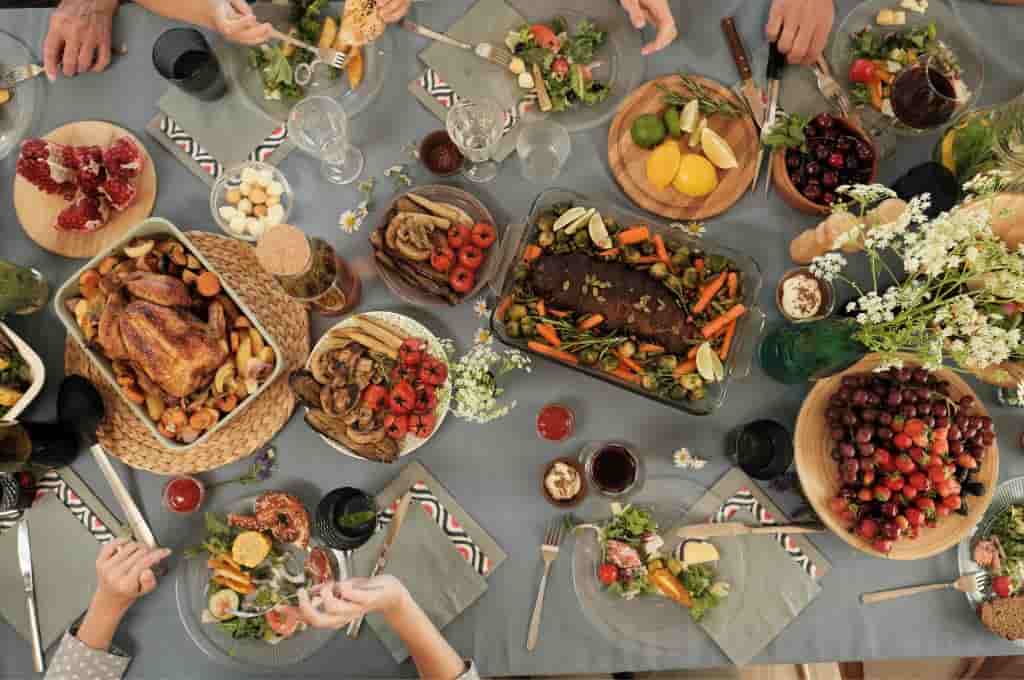How to Plan a Successfulu Family Reunion?
- By Seema
- Updated on Feb 12th, 2025
Family ties our past together, serve as a constant reminder of our origins, and provide encouragement as we move into the future. However, families tend to grow apart as they grow in size. Most of us make an effort to meet our immediate family, but our extended family is frequently overlooked. Relatives do not see each other for years due to clashing schedules, hectic lifestyles, and distant locations. Taking a multi-generational trip with grandparents, parents, and kids can be an excellent way to bring everyone together. It’s a fantastic opportunity to reconnect, reminisce, have fun, and make lasting memories.
Although multi-generational vacations can be enriching, they can also be quite challenging. Planning a trip with multiple families and generations who may have conflicting needs, preferences, and budgets can be complicated and overwhelming. Keeping the extended family happy while dealing with their eccentricities, shortcomings, and distinct temperaments is never easy.
My family is enormous and is dispersed across the globe, with members ranging in age from 3 months to 90 years. We’ve hosted 7-8 multi-generational family reunions that have involved grandparents, uncles, aunts, cousins, nephews, and nieces. However, it requires a significant amount of planning and effort to make it happen. So, here are a few pointers to help you organize a fun and stress-free multi-generational family reunion.

Why plan a Family Reunion?
Before we delve into planning a multi-generational family vacation, it’s essential to understand why a family reunion is necessary in the first place.
- Regular reunions are essential for preserving family ties. It is an excellent way to reconnect with relatives you may have lost contact with over the years. You can relive happy memories, catch up on their lives, meet new members, and renew your bonds. Previously, weddings where everyone met each other fulfilled this need. However, since the COVID-19 pandemic, wedding celebrations have shifted to small, private affairs, making it necessary to have such gatherings to strengthen bonds with the extended family.
- Family get-togethers provide a perfect opportunity to trace your ancestry and learn about your roots and culture. What can be a better way to preserve your heritage than to share it with the next generation? It might be a family recipe, a favorite song, a cherished custom, or a closely held secret that has been passed down through generations. It also encourages younger members to add their own beliefs and values to the family’s traditions.
- These gatherings allow you to commemorate significant occasions and accomplishments in your family over the years, with all of your closest relatives. It is also an opportunity to cherish your memories of recently deceased family members.
- You may have made dozens of new friends, but your first friends were your siblings. Family reunions make it possible to have fun with your cousins by revisiting cherished moments, playing long-forgotten games, and building meaningful new connections.

Tips to Plan a Multi-Generational Family Get-Together
Excellent coordination and meticulous planning are essential for ensuring a seamless and unforgettable vacation for everyone involved. It takes a lot of work to plan a multi-generational holiday, so you should start the planning process at least a year in advance to give the family ample time to plan around the event and avoid any potential conflicts. The secret is to please as many family members as you can.
1) Conduct a Poll to Assess Interest
Before planning a reunion, it is crucial to determine the number of potential attendees. The best way to accomplish this is to create a WhatsApp group and include the entire family. Then, conduct an online poll to automatically record responses, allowing you to get a rough idea of the number of people interested and their age range.
2) Settle on a Date Well in Advance
The next step would be to select a date that allows for the greatest number of people to attend and to determine the length of the event. It isn’t possible to accommodate everyone’s schedule, so could you pick the best date? Determine the most suitable time of year and narrow down 3-4 potential dates, taking into account long weekends, school holidays, and any specific days to avoid. Then, conduct an online survey to determine the most feasible time. Setting a date at least six months in advance allows people to plan their schedules, budgets, travel, and other logistics. Furthermore, the earlier you start planning, the more likely you are to get the best rates for hotels and flights.

3). Decide the Budget
Reunion expenses can quickly spiral out of control if not regulated, so create a budget before proceeding. To avoid awkward situations, discuss the budget early during the planning process. It’s crucial to establish and adhere to a budget that works for everyone, as not all families have the same income. The budget will determine the type and location of the reunion. In addition to lodging, consider food, groceries, drinks, activities, local transportation, tips, gifts, decorations, a music system, and other miscellaneous expenses. People may feel uncomfortable discussing money, so consider setting up an anonymous online poll.
4) Pick a Convenient Location
When planning a family event, it is not necessary to select a popular tourist destination, as the emphasis is on spending quality time together rather than sightseeing. Gather everyone’s input and pick a location that is easily accessible to the majority. If the family is clustered in a specific area, choose a spot nearby. If relatives are dispersed, try to find a central location to reduce travel time and expenses. It is preferable to be near a well-connected airport. The weather on the selected days in the destination should be pleasant enough for the members to engage in a few outdoor activities and excursions.
5) Find a Suitable Accommodation
Start looking for venues well in advance and obtain quotes from several properties to get the best deals. Whether you reserve several hotel rooms, a sprawling resort, or a spacious Airbnb, ensure that it is comfortable, convenient, and appealing for guests of all ages, interests, and physical abilities. All-inclusive resorts and cruises are excellent options for multi-generational family vacations, as they require less planning and offer a wide range of activities for all family members. It is also simpler to calculate costs ahead of time and plan accordingly.
The accommodation should be expansive and have a banquet hall/living room/outdoor space for gatherings, as the whole point of a family reunion is to be together with the extended family. A few leisure areas are also required so that people can congregate in small groups. To ensure ease of access for senior citizens or people with mobility issues, look for accommodations that offer lifts or ground-floor options.

6) Delegate Responsibilities
The larger the gathering, the more details to keep track of, but you don’t need to juggle everything yourself to have a successful event. It may be tempting to try to manage everything on your own, but it is best to enlist the assistance of other members. Form a planning committee of committed relatives and ask everyone to submit their work. Preferences. Assign tasks to individuals to handle various responsibilities, including lodging, entertainment, food, activities, RSVPs, accounts, and other related tasks.
7) Involve Others in the planning
A family reunion is a significant event, and getting everyone excited and on board can require considerable coordination. Given that not everyone has the exact definition of vacation, consult with various groups and seek their input. To facilitate communication, select a representative from each family unit to serve as the primary point of contact between the unit and the planning team. A multi-generational family gathering brings together people of all ages, from toddlers to the oldest grandparents. Every generation has its own mindset and preferences, and they are the best people to understand them. Therefore, include representatives from every age group on the planning team. While everyone’s input is required, there must be one person whose decision is final in the event of a conflict.
8). Decide the Menu
The food served ought to entice guests with its taste and flavors, as it is often regarded as the highlight of any gathering. Pay attention to the menu so that there is enough variety to satisfy everyone in the family. While the elderly might prefer conventional meals, children might prefer fast food favorites like pizza, pasta, and burgers. Encourage family members to share any existing allergies or food preferences they may have. A diverse menu is necessary to accommodate the specific preferences of family members, as some may be vegetarians, vegans, or gluten-free. Include delicacies that celebrate your family’s culture or country of origin. It’s a beautiful way to relive childhood memories and pass down family recipes. If the gathering is large, it is best to leave the menu and meals to professional caterers.

9) Plan the Activities and Entertainment
Relaxing and chatting with the family is always fun, but you need activities and entertainment to keep everyone together and occupied throughout the event. If your family has a wide age range, you’ll need to be creative in finding activities that cater to everyone’s ages and abilities. One option is to split up and have different age groups participate in separate activities simultaneously. It would be helpful if the venue provided on-site entertainment and activity options such as swimming pools, sports courts, and a playground.
Alternatively, you can keep everyone entertained by organizing fun activities such as board games, card tournaments, quizzes, debates, talent shows, family trivia, yard games, cooking classes, treasure hunts, dumb charades, fashion shows, Housie, and so forth. You can always include a sightseeing tour or an evening cruise to get everyone out of the resort for a different experience. Chartering a bus for excursions enables family members to spend quality time together while traveling. An icebreaker at the start of the meeting will help guests explore new relationships and encourage conversation.
10) Be Flexible
Planning ahead of time and sticking to a schedule is always a good idea. But please don’t worry about becoming too fixated with the timetable. When people of all ages are involved, some activities may take longer than anticipated. You might need to miss a couple of programs, and others might not work out, which is perfectly fine. Remember, we’re here to make memories, not to follow deadlines. Go with the flow and don’t try to micromanage every minute of the trip.
11) Leave Some Unscheduled Time
Planned activities are essential during any family get-together as they bring everyone together. Nevertheless, plan only 2-3 activities per day, and leave the rest of the time free for the family to do whatever they want. These unstructured periods can lead to some of the most rewarding experiences. Some family members may not have seen each other in a long time and want to catch up. It allows smaller family groups to pursue their own interests or hang out together. Please make sure that people have the option to opt out of activities if they need some alone time.

12) Figure Out the Details
Along with accommodations, you’ll need a variety of other amenities and services to keep such a large group comfortable, safe, and entertained. Create a vendor list and plan for decorations, catering, a stage, a music system, parking, transportation, tenting, live entertainment, and emergencies. Everything should be finalized and reconfirmed before the event to avoid last-minute complications.
13). Revisit Family Traditions and Memories
A family reunion is the result of a strong bond, mutual love, and a shared past. Exhibit photos and videos that reflect the family’s heritage and lineage. Seeing how folks looked 30-40 years ago is always fun. Introduce new members and remember those who have passed away. Encourage the elderly to share their stories, discuss their lives, and impart their wisdom. Many of these stories will take you through wars, natural disasters, and other fascinating tales from the distant past.
Capture special moments on camera and share them with others. Consider creating a family reunion scrapbook or a digital photo album to preserve memories. Incorporate family traditions into your family reunion setup through decorations, attire, food choices, and activities. You can conclude the family get-together with keepsakes like a family cookbook, photo album, or personalized items such as t-shirts/mugs/bags. These little touches will make the vacation memorable, timeless, and unique.
14) Have a Plan B
No matter how carefully you prepare and organize, a few things will inevitably go wrong – a caterer may not show up, flights may be delayed, the travel coach may be late, or the weather may be inclement. Be ready for any eventualities at all times to avoid stress and chaos. Keep a backup plan prepared in case the weather does not cooperate. Ensure your backup location has sufficient space to accommodate everyone. With a large group, there is always a possibility that someone may not be able to attend due to an injury, illness, or some other unforeseen emergency. Please try to be flexible with your bookings and ensure that everyone is aware of the cancellation cost and how it will be adjusted.

What Not to Do at a Family Reunion?
- Do not bring up sensitive issues or incidents.
- Don’t overindulge in alcohol because nothing ruins an event faster than a drunken brawl between cousins.
- Avoid gossiping about family members. You’ll be amazed by how quickly word gets around.
- A family gathering is not a fashion show. Dress appropriately, taking into account the sensitivities of everyone present.
- Don’t allow minor arguments or inconveniences to spoil your mood or your relationships with others.
- Don’t travel too far for an excursion or sightseeing tour. It takes up valuable family time and exhausts children and the elderly.
- Don’t expect everyone to show up. They might have their own issues and challenges, which they may or may not be willing to share.
Remember that flexibility is essential when organizing a family reunion. Be open to ideas and alterations, and most importantly, enjoy the process and the time spent with your family! If you keep everyone’s best interests in mind, everything will fall into place, and everyone will return home feeling a little closer to their extended family.
